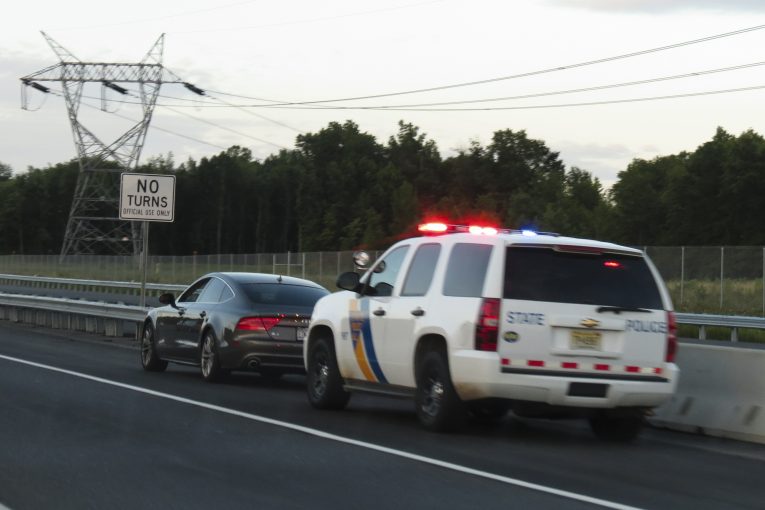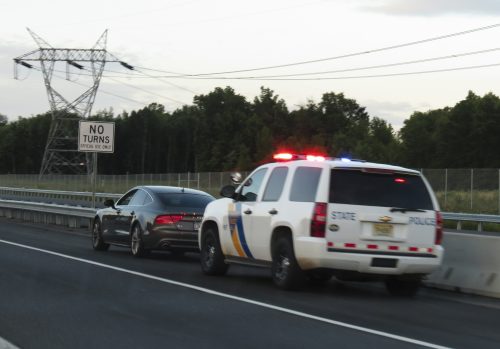

Via Wikimedia Commons
By The Vanguard Staff
SACRAMENTO, CA – The Prosecutors Alliance of California and the Los Angeles Times have now both endorsed legislation that would “end the practice of pulling over motorists for minor infractions like misplaced license plates, expired registration tags or a single broken running lights–stops that drive racial disparities, undermine public trust in policing, and make us all less safe,” notes the alliance.
A bill by California Sen. Steven Bradford (D-Gardena) “gets to the heart of the issue by eliminating minor police traffic stops for infractions — like misplaced license plate, expired registration tags or a single broken running light — that could easily be handled with a citation sent by mail, and without a stop or a search,” wrote the Times Editorial Board.
Calling it “the right move, and despite vigorous opposition by police unions,” the Times said the measure “would not erode street safety. There would remain approximately 1,000 lawful reasons, according to the bill’s backers, for police to cite drivers. Police would still be able to stop and cite motorists for reckless driving, drunk driving and unsafe driving. Two broken taillights? The officer could still pull over the car.”
“Similar bills have previously stalled under police union pressure, to the detriment of police-community relations, street safety and crime-fighting,” the Times said, “It’s time to move this bill forward and end traffic stops as a pretext for police surveillance and racially disproportionate enforcement.”
The Times also wrote Los Angeles and “other cities have been studying how to drive down disparate, ineffective and demeaning police treatment of Black and Latino drivers,” citing a state report that showed the use of force on Black drivers was 2.2 times the rate with white drivers.
The Prosecutor’s Alliance explained, “SB 50 will limit law enforcement’s ability to use minor, non-safety-related traffic infractions to conduct racially biased pretextual stops, and will ensure that local communities have the power to transfer enforcement of traffic laws to civilian staff.
“These reforms, recommended by both the Committee on Revision of the Penal Code and the Racial and Identity Profiling Advisory Board, will help protect Californians of color from unnecessary harm and help ensure that public dollars dedicated to community safety are being effectively used.”
The Alliance charged, “Law enforcement use minor vehicle equipment and administrative issues—such as a broken taillight, driving without valid registration, or incorrectly displaying a license plate—to conduct an otherwise illegitimate stop and investigation, commonly referred to as a ‘pretext stop.’”
“The Racial and Identity Profiling Board reports that Black, Latinx, Native Hawaiian, and Pacific Islander Californians are more likely to be subject to pretextual stops than their white counterparts, even though stops of people of color are less likely to result in the discovery of evidence or criminal prosecution then stops of white people.”
“Pretextual stops inflict devastating harm on Californians of color—including dehumanization, economic extraction through fees and fines, physical violence through uses of force, and devaluation of life,” added the alliance, noting “These practices divert law enforcement from other more valuable work.
“A 2022 study found that Sheriff’s deputies in Los Angeles and Riverside counties spent nearly 9 out of every 10 hours on stops initiated by officers rather than responding to calls for help. Amongst those officer-initiated stops, approximately 80 percent were for traffic violations…SB 50 is a long overdue reform to address the harms of racial profiling and promote equal treatment under law.”
The LA Times Editorial Board wrote, “An enormous amount of police time and resources go into traffic patrol, in which officers pull over motorists for infractions as minor as a single nonfunctioning taillight. Traffic stops have become police surveillance tools, a pretext to search vehicles for guns, drugs or other goods that might be stolen, illicit or dangerous.”
Explaining “A standard tactic is for the officer who stopped the car to say, ‘Do me a favor and open the trunk.’ The driver, having handed over a driver’s license and registration, is clearly not free to go and is unlikely to believe he or she has an option regarding the search.
“But the officer can testify in court that the search was consensual, because the driver was just doing the officer ‘a favor, not complying with an order,” the Times said these kind of searches are aimed at “disproportionately people of color, especially Black drivers. The stops have become a major cause of resentment and mistrust of police in the Black community, and also a major factor in needless police violence when encounters escalate from routine to tense and sometimes fatal.”
The Times Editorial Board cited an “analysis by the Police Commission’s inspector general confirmed that the use of pretextual stops was a failed crime strategy. It also revealed that police failed to report many of their stops as required by California law.
“Video showed that police subjected Black and Latino motorists to harsher treatment: handcuffing them, forcing them to stand with their face against walls or lie down on the pavement, questioning them about their backgrounds and checking their tattoos. None of it helped lower the crime rate.”
